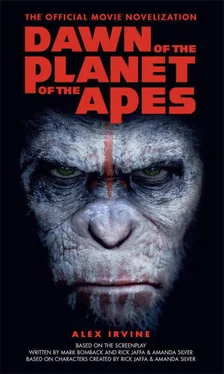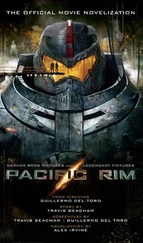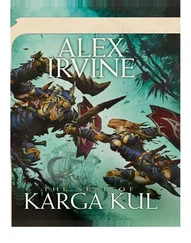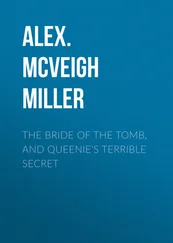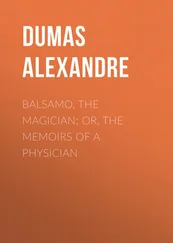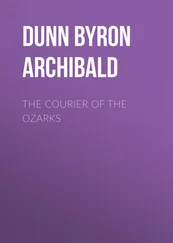The bridge was not completely broken, but pieces of its surface had fallen away. Wrecked and abandoned cars clogged the pathways, leaving only one open. Koba thought it seemed like humans must have cleared it. All those cars would not have died or crashed in every path but one. He decided to include this in his report to Caesar. It meant the humans had been organizing and working here for some time.
That meant there were many of them.
And that meant they were a threat to apes.
He looked toward the city. Below the other end of the bridge was a large ship, damaged and partly burned. Perhaps the humans had fought each other on that ship. It rested at anchor near a heavy stone building, four stories tall, a long rectangle that reached under the curved steel supports holding that end of the bridge up.
Beyond it, the city looked quiet. Koba could not see any more humans.
He heard the trucks approach, and shifted around to watch them. They drove slowly across the bridge, coming to a stop at the far end. Koba squinted. His eye was not good enough to see what they were doing. He poked Stone, who saw farther, and signed.
What are they doing?
More humans are meeting them , Stone signed. Five. With more guns. They are talking.
That made twelve humans. Ten men, one woman, one boy. If there was only one woman, they would not let her go into the mountains. She would be too precious. So there must be more women as well… and if there were more women, there would be more children.
They all have guns?
Stone nodded.
This was enough, thought Koba. He signed to Stone.
Look over the city. Tell me if you see smoke .
Stone shifted around on the pillar to get a better view. He gazed out. Koba looked in that direction, too, but all his eye saw were buildings. Tall buildings, short buildings, made of stone or glass or steel. Some looked unfinished. He wished he could kill the human who had blinded him.
He grunted at Stone.
Well?
Stone eased himself back around the pillar, hiding himself from the distant humans at the other end of the bridge.
Yes , he signed. There is smoke .
Koba nodded. He signaled to the other two.
Back under the bridge. We will see what makes this smoke, and how many humans there are .
They dropped down the pillar, using it as cover to avoid the gaze of any human who might look their way. Caesar would learn much when they returned to the village, Koba thought. The apes could no longer go on believing they were alone, and humans had already proved they would use their guns first, and talk later. There would be no lasting peace between human and ape.
All that remained was to plan for the war.
Malcolm eased up to the security checkpoint on the San Francisco side of the bridge, and saw Finney coming out to meet him. Right behind him came Dreyfus.
The man himself , Malcolm thought. The whole colony must be on pins and needles waiting to see what we found up there.
Boy, were they going to get more than they anticipated.
Watching Dreyfus approach, Malcolm pondered the irony—was it irony?—of bringing this kind of information to a checkpoint that had been built during the desperate days when the Simian Flu was killing a million people a day. It was almost as if he was bringing a new panic, and once again it was apes that would be infecting the human survivors. Only this time the contagion was fear.
If anyone could handle it, though, Dreyfus could. He’d been police chief, and then briefly mayor in the last moments before the Simian Flu had destroyed human civilization. As more and more people died, the survivors looked to whatever authority was still there—and Dreyfus had been up to the challenge. He’d held them together through the plague and its aftermath, and through the spasms of violence that had threatened to tear the survivors apart.
Along the way he had put a lot of people in the ground. Maybe too many. But the Colony, their settlement in what had once been San Francisco’s downtown, was there because he had kept them together, and done what needed to be done.
Now he was expecting Malcolm’s report on an old dam up the valley. Malcolm had news about the dam… and a whole lot more. He wasn’t sure how to handle it.
As Dreyfus came around the front end of the truck, Malcolm rolled the window down.
“So? Did you find it?” Dreyfus asked.
“It’s up there,” Malcolm said. So are a bunch of pissed-off apes , he added mentally. “Right where the records said it was. The dam looks more or less intact. It could probably start generating power for us within a week… once we get a crew up there working on it.”
“That’s great,” Dreyfus said. He broke into a broad grin, and Dreyfus wasn’t a man who smiled that often. Then he caught something in Malcolm’s demeanor. He leaned a little closer to the window.
“What? What’s the matter?”
Malcolm cut his eyes at the sentries. Good people, but he didn’t want to spread this revelation too far, too fast.
“I need to talk to you,” he said.
* * *
Malcolm needed the group together to figure out how they were going to handle this situation. He left Foster to drive the second vehicle and the rest of the group jammed into his truck, along with Dreyfus. They drove along the Presidio Parkway and into the city as Malcolm filled Dreyfus in on what they had seen.
“It was right after we found the dam,” he started. “We checked it over from the outside first, then went in and found a way to access the control room. There wasn’t any damage, just ten years of rust. Assuming we can replace corroded wiring and run it from the generators at first, it ought to be functional. Most of the transmission wiring is intact, but until we try to get power throughput, we won’t know if there are problems there. Oh, and we’ll have to clear the logjam at the intake, but that’s just labor. So yeah, I think—”
“You didn’t bring me on your tour so you could give me a report I could have heard back at the Colony,” Dreyfus said. “What are you avoiding?”
Malcolm slowed and navigated around a block of storefronts that had collapsed in the earthquake that had struck a couple of years after the plague. By then, too many people were dead for there to be any kind of restoration effort. They’d abandoned most of San Francisco, leaving it to fall into ruin, and that’s exactly what had happened. Everything was overgrown, parks turned to pockets of wilderness and gardens spreading out to take over sidewalks and streets. It had happened with incredible speed, Malcolm thought. Without a million people making daily efforts to hold it back, nature took over.
“Apes,” he said. “We saw apes.”
He could feel Dreyfus’s gaze as he skirted another spill of bricks and masonry that was blocking part of the intersection at Lombard and Van Ness. He turned south.
“Apes,” Dreyfus repeated.
“On our way back after we inspected the dam. Carver went down to the river to fill his canteen, and two of them were there. He shot one of them.”
Dreyfus looked back at Carver.
“Damn right I did,” Carver said. “If either one of ‘em had taken another step, I’d’ve shot ‘em both.”
Malcolm was accustomed to Carver’s coarse bravado. So, he saw, was Dreyfus, who looked at the man a moment longer before turning to face forward.
“Go on,” he said. He was already thinking, planning.
“We heard the shot, and we came running,” Malcolm said. “One of the chimps was trying to take care of the one Carver shot. Then…” He took a deep breath, and let it out. “Then a lot more of them showed up. All at once. They had weapons they’d made themselves. Spears, clubs…” Malcolm trailed off, remembering the sight.
Читать дальше
